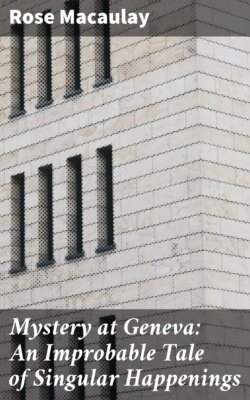Читать книгу Mystery at Geneva: An Improbable Tale of Singular Happenings - Macaulay Rose - Страница 4
На сайте Литреса книга снята с продажи.
2
ОглавлениеTable of Contents
The Secretariat were in a state of disturbance and expectation. The annual break in their toilsome and rather tedious year was upon them. For a month their labours would be, indeed, increased, but life would also move. One wearied of Geneva, its small and segregated society, its official gossip, the Calvinistic atmosphere of the natives, its dreary winter, its oppressive summer, its eternal lake and distant mountains, its horrid little steamboats rushing perpetually across and across from one side of the water to the other—one wearied of Geneva as a place of residence. What was it (though it had its own charm) as a dwelling-place for those of civilised and cosmopolitan minds? Vienna, now, would be better; or Brussels: even the poor old Hague, with its ill-fated traditions. Or, said the French members of the staff, Paris. For the French nation and government were increasingly attached to the League, and had long thought that Paris was its fitting home. It would be safer there.
However, it was at Geneva, and it was very dull except at Assembly time, or when the Council were in session. Assembly time was stimulating and entertaining. One saw then people from the outside world; things hummed. Old friends gathered together, new friends were made. The nations met, the Assembly assembled, committees committeed, the Council councilled, grievances were aired and either remedied or not; questions were raised and sometimes solved; governments were petitioned, commissions were sent to investigate, quarrels were pursued, judgments pronounced, current wars deplored, the year's work reviewed. Eloquence rang from that world-platform, to be heard at large, through the vastly various voices of a thousand newspapers, in a hundred rather apathetic countries.
In spite of the great eloquence, industry, intelligence, and many activities of the delegates, there was, in that cosmopolitan and cynical body, the Secretariat, a tendency to regard them, en masse, rather as children to be kept in order, though to be given a reasonable amount of liberty in such harmless amusements as talking on platforms. Treats, dinners and excursions were arranged for them; the Secretariat liked to see them having a good time. They would meet in the Assembly Hall each morning to talk, before an audience; noble sentiments would then exalt and move the nations and be flashed across Europe by journalists. But in the afternoons they would cross the lake again to the Palais des Nations, and meet in Rooms A, B, C, or D, round tables (magic phrase! magic arrangement of furniture and human beings!) in large or small groups, and do the work. The Assembly Hall was, so to speak, the front window, where the goods were displayed, but where one got away with the goods was in the back parlour. There, too, the fiercest international questions boiled up, boiled over, and were cooled by the calming temperature of the table and the sweet but firm reasonableness of some of the representatives of the more considerable powers. The committee meetings were, in fact, not only more effective than the Assembly meetings, but more stimulating, more amusing.
Henry, entering the Palais des Nations, found it in a state of brilliant bustle. The big hall hummed with animated talk and cheerful greetings in many tongues, and members of the continental races shook one another ardently and frequently by the hand. How dull it would be, thought Henry, if ever the Esperanto people got their way, and the flavour of the richly various speech of the nations was lost in one colourless, absurd and inorganic language, stumblingly spoken and ill understood.
Henry entered a lift, was enclosed with a cynical American, a brilliant-looking Spaniard, a tall and elegant woman of assurance and beauty, and an intelligent-faced cosmopolitan who looked like a British-Italian-Latin-American-Finn, which, in point of fact, he was. Alighting at the third floor, Henry found his way to the department he required and introduced himself to one of its officials, who gave him a pink card assigning him to a seat in the press gallery, which he felt would not be one he would really like.
“You've not been out here before, have you,” said the official, and Henry agreed that this was so.
“Well, of course we don't expect much of a show from your fanatical paper....” The official was good-humoured, friendly, and tolerant. The Secretariat were, indeed, sincerely indifferent to the commentary on their proceedings both of the Morning Post and the British Bolshevist, for both could be taken for granted. One of these journals feared that the League sought disarmament, the other that it did not; to one it was a league of cranks, conscientious objectors, and (fearful and sinister word) internationals, come not to destroy but to fulfil the Covenant, bent on carrying out Article 8, substituting judiciary arbitration for force, and treating Germany as a brother; to the other it was a league of militarist and capitalist states, an extension of the Supreme Allied Council, bent on destroying Article 18 and other inconvenient articles of the Covenant, and treating Germany as a dog. To both it was, in one word, Poppycock. Sincerely, honestly, and ardently, both these journals thought like that. They could not help it; it was temperamental, and the way they saw things.
